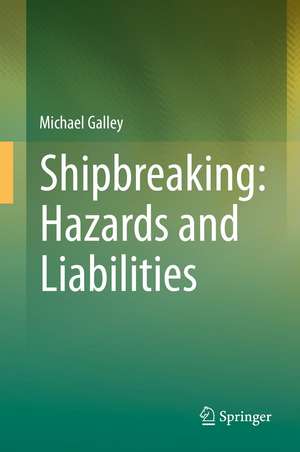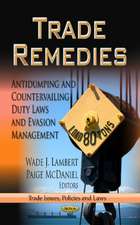Shipbreaking: Hazards and Liabilities
Autor Michael Galleyen Limba Engleză Hardback – 29 iul 2014
Ship breaking was a relatively obscure industry until the late 1990s. In just 12 years, action by environmental NGOs has led to the ratification of an international treaty targeting the extensive harm to human and environmental health arising from this heavy, polluting industry; it has also produced important case law.
Attempts to regulate the industry via the Basel Convention have resulted in a strong polarization of opinion as to its applicability and various international guidelines have also failed because of their voluntary nature. The adoption of the Hong Kong Convention in 2009 was a serious attempt to introduce international controls to this industry.
| Toate formatele și edițiile | Preț | Express |
|---|---|---|
| Paperback (1) | 639.25 lei 6-8 săpt. | |
| Springer International Publishing – 23 aug 2016 | 639.25 lei 6-8 săpt. | |
| Hardback (1) | 644.18 lei 6-8 săpt. | |
| Springer International Publishing – 29 iul 2014 | 644.18 lei 6-8 săpt. |
Preț: 644.18 lei
Preț vechi: 757.85 lei
-15% Nou
Puncte Express: 966
Preț estimativ în valută:
123.27€ • 131.81$ • 102.77£
123.27€ • 131.81$ • 102.77£
Carte tipărită la comandă
Livrare economică 18 aprilie-02 mai
Preluare comenzi: 021 569.72.76
Specificații
ISBN-13: 9783319046983
ISBN-10: 3319046985
Pagini: 272
Ilustrații: XXXVI, 236 p. 6 illus., 5 illus. in color.
Dimensiuni: 155 x 235 x 20 mm
Greutate: 0.52 kg
Ediția:2014
Editura: Springer International Publishing
Colecția Springer
Locul publicării:Cham, Switzerland
ISBN-10: 3319046985
Pagini: 272
Ilustrații: XXXVI, 236 p. 6 illus., 5 illus. in color.
Dimensiuni: 155 x 235 x 20 mm
Greutate: 0.52 kg
Ediția:2014
Editura: Springer International Publishing
Colecția Springer
Locul publicării:Cham, Switzerland
Public țintă
ResearchCuprins
1. Industry Development and the Process of Disposal.- 2. The Role and Application of International Law.- 3. Legislation.- 4. Ship Registration, Owner Anonymity and Sub-Standard Shipping.- 5. Case Studies and Legal Judgements.- 6 The Hong Kong Convention 2009.- 7. Other Proposals.- 8. Conclusions.
Textul de pe ultima copertă
Most of the world’s redundant ships are scrapped on the beaches of the Indian sub-continent, largely by hand. As well as cargo residues and wastes, ships contain high levels of hazardous materials that are released into the surrounding ecology when scrapped. The scrapping process is labour-intensive and largely manual; injuries and death are commonplace.
Shipbreaking was a relatively obscure industry until the late 1990s. In just 12 years, action by environmental NGOs has led to the ratification of an international treaty targeting the extensive harm to human and environmental health arising from this heavy, polluting industry; it has also produced important case law.
Attempts to regulate the industry via the Basel Convention have resulted in a strong polarization of opinion as to its applicability, and various international guidelines have also failed because of their voluntary nature. The adoption of the Hong Kong Convention in 2009 was a serious attempt to introduce international controls to this industry.
Shipbreaking was a relatively obscure industry until the late 1990s. In just 12 years, action by environmental NGOs has led to the ratification of an international treaty targeting the extensive harm to human and environmental health arising from this heavy, polluting industry; it has also produced important case law.
Attempts to regulate the industry via the Basel Convention have resulted in a strong polarization of opinion as to its applicability, and various international guidelines have also failed because of their voluntary nature. The adoption of the Hong Kong Convention in 2009 was a serious attempt to introduce international controls to this industry.
Caracteristici
Uses a range of legal case studies to examine the arguments offered for and against the status quo of the industry Examines the industry in terms of international, regional and national legal instruments, both current and proposed, that impact upon the industry Considers the development of the new Ship Recycling Convention and its provisions as well as a number of perceived lacunae Also considers new initiatives in ship breaking that are developing both independently and to promote the adoption of the Convention Considers the selective use of flag registration and its role in providing anonymity from liability
















